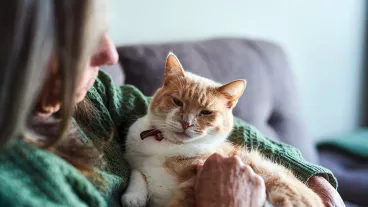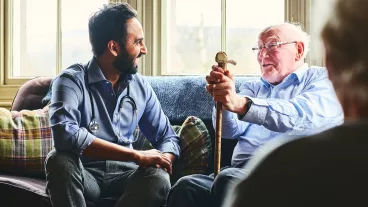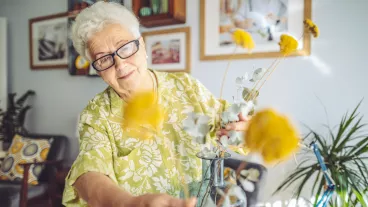Report shows isolation impacting older people
February 2024
Download Media release
Researchers from the Australian Institute of Family Studies (AIFS) are encouraging communities to better support older people, as a new report reveals the experiences and impacts of social and geographical isolation.
Based on interviews with NSW service providers and a review of published research, the study highlights that isolation is a risk factor for the abuse and mistreatment of older people and can lead to memory loss, poor diet and self-care, decreased mobility and increased risk of mortality.
The study was commissioned by Seniors Rights Service and funded by the NSW Government.
Co-author and Acting Research Fellow at AIFS, Dr Emily Stevens, said the problem is particularly acute in rural and regional areas where access to critical services like healthcare and transport can be lacking.
'Many people living in rural or regional communities are already physically isolated from family and friends – but they also can have trouble seeing social workers, healthcare specialists or accessing critical in-home services.
'This obviously directly impacts on their health – but it also means they are speaking to fewer people, and missing out on social connections,' Dr Stevens said.
Dr Stevens said the ageing process coupled with environmental factors can lead to older people having fewer social connections, which can have significant impacts.
'Social isolation can not only affect an older person’s wellbeing and engagement in life, but things like personal hygiene and diet can also slip because they think ‘what is the point if I’m not seeing anyone’.'
As well as leading to a range of adverse health outcomes, Dr Stevens said isolation is also a strong risk factor for elder abuse.
'We know through the National Elder Abuse Prevalence Study (NEAPS), that not being in regular contact with family and friends puts people at higher risk of experiencing abuse and mistreatment – including psychological, financial, physical and sexual,' Dr Stevens said.
Dr Stevens said isolation can come about through a range of factors, including family conflict, illness or reduced mobility – but the local community also plays a critical role.
'Ageism and social stigma around the ageing process can lead to social isolation – so being open-minded and doing basic things like making eye contact and smiling, or saying hello over the fence to a neighbour, can all help,' Dr Stevens said.
'If the person has limited contact with family and friends, neighbours, shopkeepers and strangers on the street might be the person’s only social contact for the day, or even week.'
Dr Stevens said a lack of confidence using technology and accessing transport can also be a barrier to social connection, which could be addressed by business, industry and governments at all levels through age-friendly infrastructure and education programs.
Seniors Rights Service commissioned AIFS to undertake the study to examine the factors, dynamics and effects of isolation experienced by older people in NSW. The study was based on a desktop review and qualitative interviews with professionals.
AIFS has published four reports as part of the package:
- Factors, dynamics and effects of isolation for older people: an exploratory study (Research Report)
- Factors, dynamics and effects of isolation for older people (Research Snapshot)
- Social isolation: Factors, dynamics and effects of isolation for older people (Research Snapshot)
- Geographic isolation: Factors, dynamics and effects of isolation for older people (Research Snapshot)
Senior Rights Service supports older people with free legal advice, advocacy and information.
News story
Media contact
Kate O'Connor
Phone: 0499 860 257
Email: kate.o'[email protected]
Related publications

Factors, dynamics and effects of isolation for older people
This snapshot discusses what factors give rise to isolation and how it is experienced by older people.
Read more
Social isolation: Factors, dynamics and effects of…
This snapshot discusses social isolation for older people being an objective lack of connection and interaction with…
Read more
Geographical isolation: Factors, dynamics and effects of…
This snapshot briefly summarises the barriers to accessing services and supports for geographically isolated older…
Read more